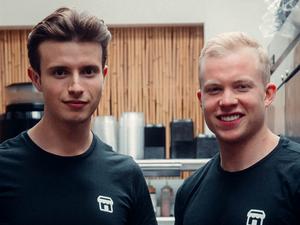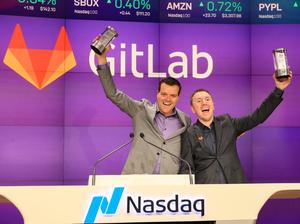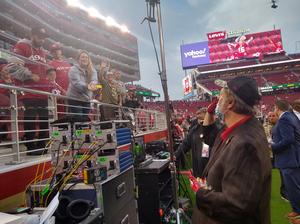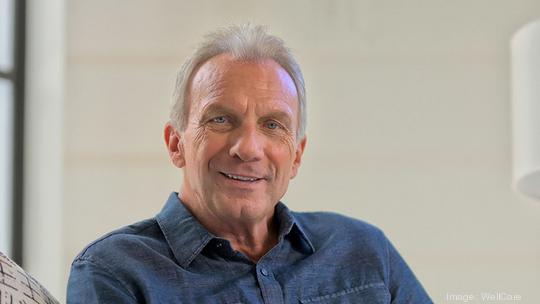
Liquid 2 Ventures LLC — the San Francisco venture capital firm founded by San Francisco 49ers Hall of Fame quarterback Joe Montana, Michael Ma and Mike Miller — raised a third core fund of $80 million in December to supply seed-stage cash to startups.
The oversubscribed fund follows a $50 million second fund and an initial core fund of $28 million. The cash has gone into companies such as collaborative software development tool company Gitlab (NASDAQ: GTLB), which raised $800 million when it went public last year, and, most recently, virtual selling platform Enable.us and leisure boat startup San Francisco-based Navier.
We talked to Liquid 2 managing partner Montana and his son Nate Montana — a Liquid 2 general partner — about the new fund, what Liquid 2 looks for in entrepreneurs and how long-ago lessons from 49ers legendary coach Bill Walsh shape how the firm's built its team.
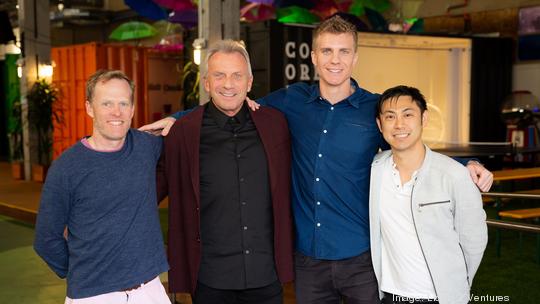
What's the focus of this fund? How many companies do you hope to fund through it? Nate: The focus will be to continue to double-down on the strategy. We have a combined 27 unicorns across the first two funds, so we will continue finding amazing founders and building out Liquid 2's network of top-tier entrepreneurs across a variety of different verticals. In Fund III, we're looking to fund around 100 to 150 companies. The average check size ranges from $250,000 to $500,000, but remains flexible both above and below those targets.
Joe: Sometimes it could be a little lower than that, occasionally, depending on how early we get involved.
Who are the LPs in this third fund? Is there consistency from the other two funds? Nate: The majority of our LP base making up the funds are the institutions and family offices as well as high-net-worth individuals that have supported us in both Fund I and Fund II. A lot of them have grown their position significantly. For Fund III, one of our early supporters backed out — it was solely a thesis-based (decision). Part of our value proposition is the entrepreneurs in our network and the way we've been able to advise these entrepreneurs early on. We'd rather double-down on the strategy we know is working.
That range you're talking about — roughly $250K to $500K — that's not what biotechs may be looking for, for example. But I noticed you have companies at the intersection of health and tech, like Nurx and Truepill. Is that space something you see growing? Nate: Health tech has definitely been a theme within the portfolio. One biotech would be Colossal Biosciences, which is working on bringing back the wooly mammoth. That's one we've announced.
Joe: A lot of it, too, has to do with working remotely and people being more comfortable — the doctors are getting more comfortable with having telemedicine. We had one founder that I love — she was just way too early — and she's still alive but she was just way too early in the telemedicine industry. She had this technology that read your skin and it was pretty crazy, but I think people are becoming more and more willing to do things remotely. Who would have ever thought about buying insurance on the internet before? A lot of industries are moving into that combination (with tech).
Especially where you're investing, in that early stage, what is your "ah-ha" moment when you think, "We're going to invest in Company A as opposed to Company B"? Nate: If you talk to each partner, we'll probably give you a different example, but I think one of the triggers is how resilient are these founders. Finding ways to discover those values, how gritty — and, I guess, how big of hustlers are they is another way of putting it — determines what they have done to get to the point they are: Is this a problem they experienced personally? And are there major pain points that they're going to solve, not only for the community but for themselves? The motivation around that is something that's important to us. We're not here to invest in founders that have developed early-exit strategies for an early-stage company; we're looking for folks that will bring venture-scale returns versus looking for a quick $100 million exit.
Joe: The other two things: One, we've come across as long as we've been around — or as short as we've been around — we're still finding second and third founders. That makes it a pretty quick decision for us. Second, the old saying is, "You can't have a billion-dollar company if you don't have a billion-dollar market." So a lot of it deals with, is the market size big enough to get the return we want.
So founders' empathy for the problem has a lot to do with a decision to invest. Nate: Yeah — finding the reason or motivation for starting the company goes a long way to telling the business story.
It doesn't sound like you're passive investors. It sounds like you're bringing something to the game for the founders. Joe: For these guys — all three of them — Mike and Michael's companies went through Y Combinator, Nathaniel's startup that he joined early in the process, have all learned how to grow companies to a place for an exit to large companies. That's one of our strong points that we are able to bring, their resilience and their lessons learned. Nathaniel's company got bought by Twitter, Michael Ma's company's got bought by Google and Mike Miller's company got bought by IBM. So all have had exits and understand that process and have been able to bring that expertise into our founding teams. Early founders are turning us on to people who are leaving their companies and starting companies and everyone's saying, "Hey, you should go check with those guys because they've been able to help."
You look at our Gitlab founders, they say we were one of the biggest helps at the start of their growth in getting them into a Series A. A lot of times, we lose track after that, because the big guys come in and they elbow you out of the way, and rightly so to a certain degree, because our strength is really on those three guys and their ability to help the companies really early in their timeframe, where a lot of companies would fail without getting the right direction.
What have you both learned — Nate from your start in angel investing until now and Joe with your own firm? Joe: Early on, we were all pretty much hands-on. I spend more time with the portfolio companies than I do with chasing deals. It's about the team, right? At some point, you have to have the confidence and let everybody do what they do and to their strengths.
Nate: For me it's been more the development of passions as we continue to invest in a wide variety of companies. I'm passionate about honing in on topics and continuing to educate myself. We're fortunate enough to get to talk to some of the smartest people in the world, and we're never the smartest people in the room. Bringing hustle and any of the connections we can to these portfolio founders and figuring out how to help fuel our entrepreneurs has been a real pleasure.
Joe, what did Bill Walsh bring to your development as an entrepreneur? Joe: Bill and his ability to put together a team and let the team work was kind of like I was telling you how I stepped back and let these guys chase the deals. I've become more of an overseer and understander because I still learn from them every day. We have a Ph.D. in particle physics on the team and it's fun to jump in on some calls and listen to him talk and Nathaniel's visions when he's talking to companies and Michael's — they're all different. So you pick up different things here and there. But I think the biggest thing Bill brought to the table is, "I'm looking for guys to fit together." They're all different, but they have the same kind of like-mind. They're all different, but they're all necessary.

